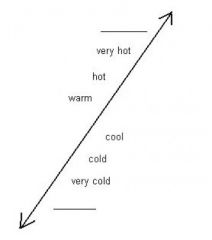![]()
![]()
![]()
Use LEFT and RIGHT arrow keys to navigate between flashcards;
Use UP and DOWN arrow keys to flip the card;
H to show hint;
A reads text to speech;
9 Cards in this Set
- Front
- Back
- 3rd side (hint)
|
The Importance of Lexis (Vocabulary)
|
Write a story that relies on the unit's vocabulary words. Remove the words from the story without leaving blanks and ask the students to decipher what is happening.
|
He rode a to the and found that his sister had placed a in the lower part of the making the crash.
|
|
|
CONVEYING CONCEPTS
4 Ways to Share New Vocabulary |
1. Visuals -- Drawings on the board, flash cards, movies, photos...
2. Realia -- Real life examples of objects... 3. Mime -- Acting out activities or concepts. 4. Gesture -- Using facial expressions, pointing at things or people. |
|
|
|
CLINES
What are they, what are they used for? |

|
|
|
|
KNOW YOUR WORDS
Different words are appropriate in different contexts--relying on formal language isn't always effective (dealing with close friends, for example)! What are four guidelines for testing which words are appropriate when? |
1. Restricted to technical use (like medical, legal terms...)
2. Old fashioned (like groovy, wretched...) 3. Literary (purple prose...) 4. Slang, regional or impolite ("bloody" is borderline swearing in Britain...) |
Is the word....
|
|
|
AUTOBIOGRAPHY
|
The student is 60 years old, very famous and a popular magazine wants to write a tribute article about their life. Students write their own articles, combining personal details with imagined tidbits. Great practice for past tense.
|
|
|
|
LETTER OF COMPLAINT
|
Use pictures and questions to set the scene: You’ve just been on a holiday abroad. You bought a package tour through a well-known travel agent - and in the brochures and descriptions it looked fantastic. In truth it was an absolute disaster. Write to the travel agent to complain and request some form of compensation.
Process writing as above with: brainstorming other problems and appropriate compensation; rough notes; drafting etc. Feedback on final copies can be done in one of two ways: (a) They exchange letters with a partner and read them taking on the role of Manager of the travel agency. This is followed up with two role-plays (once with each person in the pair acting as Manager) based on the letters. (b) They each pass their letter to the person on their right. They take on the role of Manager of the travel agency, and write a letter in response. Response letters are then passed back, and students find out whether the Manager has given them an appropriate apology and compensation. |
|
|
|
SPOT THE DIFFERENCE
|
Students work in teams and race against one another to find the most differences between two similar pictures. The winning team must list every find using good grammar in the present/present continuous tense. "The cow has two spots." "Three girls are swimming next to the tree."
|
|
|
|
ROLE PLAY in the future tense
|
A problem solving scenario: A politician is visiting your city. The mayor has hired a team of Events Managers to co-ordinate the event. The group has a sheet with various aspects, such as the travel route, security details, timing for different stages of the event such as the opening ceremony, etc, that they need to prepare (less likely to use Present Simple) and then present (likely to use a combination of Present Simple and other structures).
|
|
|
|
7 Things to Monitor During a Task
|
check that students know what to do
see how quickly they’re doing it see which parts of the task are too easy/challenging provide assistance during the task if necessary get ready for feedback, advice, and suggestions after the task take note of good or inaccurate language use sometimes provide error correction |
|

